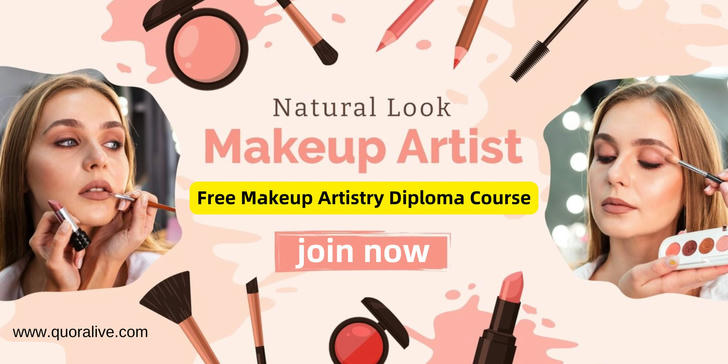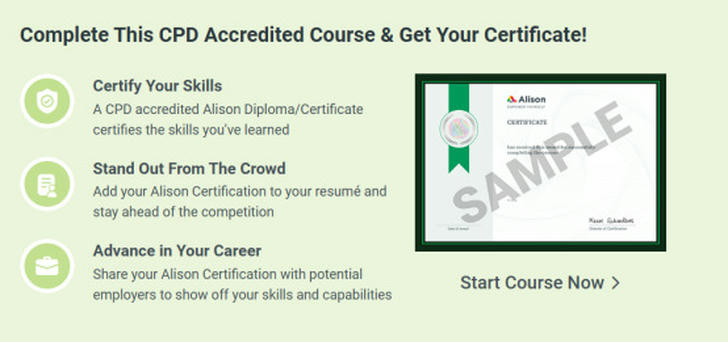Makeup Industry Beginners Must Read: ALISON’s Free Course Helps You Become a Professional Makeup Artist
Recently, the U.S. makeup industry has changed a lot. Consumers want more personalized, healthy, and eco-friendly products. Natural makeup and lightweight products are now popular, focusing on skincare and non-toxic choices. Social media and influencers quickly spread new trends, making the industry more diverse, with products for all skin tones and types.

Course Overview
To meet this growing demand, ALISON offers a free online Diploma in Cosmetics. This free online course includes 6 to 10 hours of study time, CPD accreditation, and a final assessment.
This Diploma course covers everything you need to know to become a professional makeup artist. It teaches you how to apply professional-level makeup for various occasions, including film and photo shoots. We explore the reasons people seek makeup artists and design techniques to enhance the appearance of eyes, lips, and skin to transform the overall look. This course is ideal for anyone who wants to learn professional makeup skills, even if you simply want to look your best.
Course Modules
The course consists of 17 modules, each covering the essential knowledge and skills required to become a professional makeup artist. Here is a brief overview of each module:
Module 1: Why People Wear Makeup
Learn the psychology and cultural background of makeup, explore its impact on personal appearance and confidence, and discover how makeup techniques can enhance the eyes, lips, and skin.
Module 2: The History of Cosmetics
Review the evolution of cosmetics, from ancient times to the modern day, and understand how it influences current makeup techniques and product choices.
Module 3: Makeup as a Profession
Explore the career path of a makeup artist, including different job options, salary ranges, and how to plan your career in the makeup industry.
Module 4: Skincare
Learn the basic structure of skin and skincare methods, and master how to recommend the right skincare products for different skin types.
Module 5: Makeup Tools
Introduction to commonly used makeup tools (brushes, sponges, etc.) and their correct usage to ensure the best makeup results.
Module 6: Using Brushes
Learn about different types of makeup brushes and their techniques to apply foundation, blush, and other products with precision.
Module 7: Makeup Artistry Diploma – First Assessment
A preliminary assessment to review progress, consolidate knowledge, and identify areas that need further study.
Module 8: Skin Tone and Foundation
Understand how to choose the right foundation based on skin tone and type, and master proper foundation application for a natural, even finish.
Module 9: Corrective Makeup
Learn how to use concealers, contouring products, and other corrective makeup to fix blemishes and create a flawless look.
Module 10: Beauty Makeup
Explore how to create various makeup styles for clients based on their needs and the occasion, mastering beauty makeup fundamentals and techniques.
Module 11: Eye Makeup
Master eye makeup techniques, including eyeliner, eyeshadow, and lashes, to create natural and captivating eye looks.

Module 12: Face Makeup
Learn how to shape eyebrows, apply blush, and create perfect lip makeup, accentuating facial features.
Module 13: Makeup Application
Through case studies, learn how to design makeup looks for different events like films and advertisements, ensuring the makeup looks perfect in various environments.
Module 14: Occasions and Business
Master how to design makeup for different seasons and events (weddings, parties, etc.), and learn how to grow your own business in the makeup industry to enhance client service.
Module 15: Makeup Artistry Diploma – Second Assessment
A second assessment through a quiz to review learned content and prepare for the final exam.
Module 16: Course Videos
Watch selected videos that demonstrate various makeup techniques, helping students understand and practice the skills effectively.
Module 17: Course Evaluation
A final assessment to test overall knowledge and skills, ensuring students are ready to become professional makeup artists.

This course will help you start a career in the beauty industry but is also ideal for anyone who uses makeup and wants to enhance their skills to make the most of expensive products. Whether you plan to work for clients, yourself, or your friends, this course will elevate you from a simple "makeup wearer" to a "makeup artist."
What You'll Learn in This Free Course
◾ Describe how to use makeup techniques to enhance eyes, lips, and skin.
◾ Discuss the historical uses of cosmetics worldwide.
◾ Summarize the different career and salary options for makeup artists.
◾ Analyze the physical structure of skin and discuss skincare products and techniques.
◾ Identify beauty tools that can achieve specific effects.
◾ Discuss the types and uses of makeup brushes.
◾ Create a list of essential beauty tools.
◾ Match the right foundation with different skin types.
◾ Correctly apply foundation, primer, and concealer.
◾ Choose and apply the right foundation based on skin type.
◾ Explain how to use a range of corrective makeup tools and methods.

Career Opportunities and Job Outlook
The U.S. makeup industry offers vast opportunities for growth. With hundreds of thousands of beauty salons and makeup studios across the country, there are plenty of job openings for makeup artists. The typical monthly income for a professional makeup artist ranges from $3,000 to $7,000. With experience and skill development, income potential can increase significantly. Makeup artists can work in beauty salons, makeup studios, or as freelancers on various projects such as films, advertisements, fashion shows, and even run their own makeup studios. As market demand continues to grow, the career prospects in the makeup industry are incredibly promising, especially for those who complete professional training and continue to refine their skills.
Real-Life Example
Lily, a student of ALISON's free Diploma in Cosmetics course, completed the training and soon received a wedding makeup gig. Based on the bride’s needs, Lily first provided skincare and selected the appropriate foundation and concealer for her skin type. Using the techniques she learned in the course, she created a natural eye makeup look and contoured the face delicately, finishing with a setting spray to ensure the makeup lasted throughout the day. On the wedding day, the bride was delighted with the look, and Lily received more client bookings, boosting her reputation in the makeup industry.
Conclusion
By taking ALISON’s Diploma in Cosmetics, you will learn how to enhance eyes, lips, and skin using makeup techniques, master various tools, and select the right products for different skin types. Whether you want to create the perfect look for yourself or offer professional makeup services to others, this course will provide the support you need to succeed and stand out in the beauty industry.
